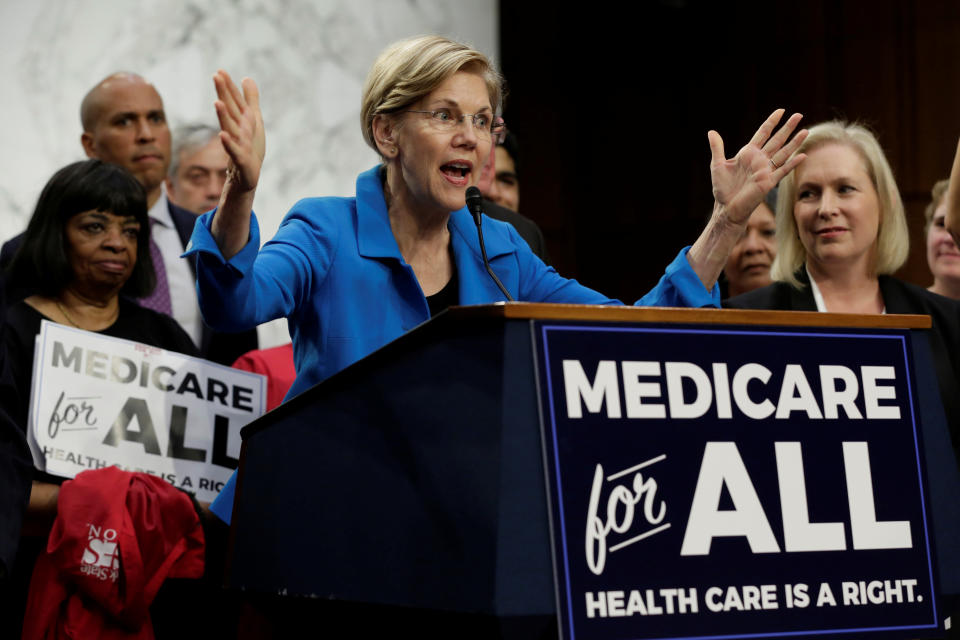Elizabeth Warren finally has a plan for Medicare for All
Sen. Elizabeth Warren released her plan on Friday, and this time one details how she would pay for Medicare for All.
Following other presidential candidates releasing their health care plans, Warren’s plan pledges that “there will be no middle class tax increases” and Americans would benefit from the elimination of premiums and other out-of-pocket-costs.
“$11 trillion in household expenses back in the pockets of American families,” the release stated. “That’s substantially larger than the largest tax cut in American history.”

Paying for Warren’s health care plan
Warren’s plan would cost "just under" $52 trillion over a decade.
So how would Warren actually pay for it? It all goes back to her wealth tax on the richest 1% of Americans and cracking down on tax evasion and fraud.
Warren wants to place a 0.1% tax on 1% on the sales of bonds, stocks, or derivatives, which she claims would raise $800 billion in revenue over the next decade and “would likely have little to no effect on most investors.”
She also wants billionaires to pay a 0.06% tax on each dollar of net worth above $1 billion, which she says would raise an additional $1 trillion in revenue.
“Yes, billionaires will have to pay a little more, but they will still likely pay less than what they would earn just from putting their assets into an index fund and doing nothing,” Warren said.
Her plan would also increase IRS funding, expand third-party reporting and withholding requirements, strengthen enforcement of the Foreign Account Tax Compliance Act, and allow employees who disclose tax evasion and abuse to receive whistleblower protections.
“A big part of our current tax gap problem is that we’re letting wealthier taxpayers get away with paying less than what they owe,” she said. “Studies show that the wealthiest 5% of taxpayers misrepresent their income more frequently than the bottom 90%.”

The sources of money to fund Warren's plan
$3 trillion with an ultra-millionaire tax
$2.9 trillion from making sure large corporations pay fair share of taxes
$2.3 trillion in net federal revenue from cracking town on tax evasion and fraud
$1.65 trillion in revenue from a country-by-country minimum tax on foreign earnings of 35% and taxation of foreign firms
$1.25 trillion over next 10 years by getting rid of asset depreciation loophole
$1.15 trillion in tax revenue by increasing take-home pay for workers
$800 billion in revenue over next 10 years from a 0.1% tax on financial transactions
$798 billion from reforming the defense budget
$400 billion in direct federal revenue from immigration reform
$250 billion in revenue "because individual spending on premiums, deductibles, copays, and out-of-pocket costs will basically disappear"
$100 billion over next 10 years from big bank fees
Total: About $14.6 trillion.
‘Providers will now get paid Medicare rates for their Medicaid patients’
Warren also stated that comprehensive payment reform will help reduce health care spending.
“Under my approach, Medicare for All will sharply reduce administrative spending and reimburse physicians and other non-hospital providers at current Medicare rates,” she said. “My plan will also rebalance rates in budget neutral way that increases reimbursements for primary care providers and lowers reimbursements for overpaid specialties.”
She added: “Why? This is partially because providers will now get paid Medicare rates for their Medicaid patients — a substantial raise. But it’s also because providers spend an enormous amount of time on billing and interacting with insurance companies that reduces their efficiency and takes away from time with patients.”
Instead of employers spending money on their workers’ health expenses, under Warren’s plan, there would be a new employer Medicare contribution. She states that this would save $200 billion over the next decade, and would help unions as well.
“We can generate almost half of what we need to cover Medicare for All just by asking employers to pay slightly less than what they are projected to pay today, and through existing taxes,” Warren said.
Adriana is an associate editor for Yahoo Finance. Follow her on Twitter @adrianambells.
READ MORE:
Economist: Medicare costs need to be brought 'under control' before expansion
'Everyone’s health insurance is more expensive' as more Americans manage chronic diseases
Millions of Americans with employer health care are still spending a fortune
Read the latest financial and business news from Yahoo Finance
Follow Yahoo Finance on Twitter, Facebook, Instagram, Flipboard, SmartNews, LinkedIn, YouTube, and reddit.

